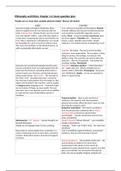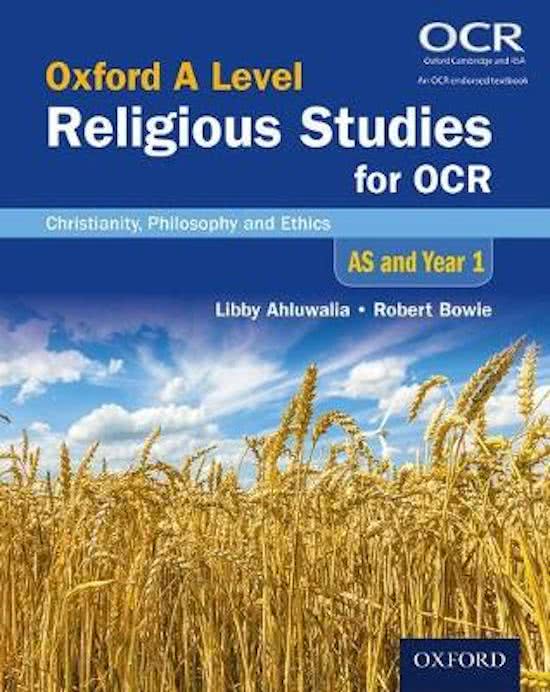Philosophy and Ethics: Chapter 1.2: Exam question plan
‘People are no more than complex physical matter’ Discuss (30 marks)
AGREE DISAGREE
Soul not created contradicts Christianity. Plato Plato: the soul is essential and immaterial. Phaedo –
doesn’t establish how the soul interacts with the Aristotle willing to die because he believed that the
body. Anthony Flew ‘Merely Mortal: Can You Survive soul would live on/afterlife. Opposites (soul vs.
Your Own Death?’ (2001) – talk of life after death is body). Meno – innate knowledge/anamnesis, slave
nonsensical, comparing the idea to the Cheshire cat boy knew algebra. Tripartite soul – chariot and
from ‘Alice’s Adventures in Wonderland’ as it would horses, reason, appetite and emotion. Simple
be impossible for a grin to be there without a face. substance, not created and has no beginning or end
The soul is the behaviour of the physical person, so
with no physicality after death, no soul.
--- Aristotle: ‘De Anima’. The soul is not an invisible
substance, more materialistic. The soul gives a living
thing its essence. Axe analogy, its essence is the
ability to chop. The soul does not survive when the
body dies – they are inseparable – wax stamp and
envelope analogy. Monomism
Descartes has not demonstrated/proved his point, Descartes: Substance dualism – ‘I think therefore I
but just asserted it. Does not really explain how the am’ ‘cogito ergo sum’. Body is divisible and can
body and mind interact, eg feeling afraid makes a extend, mind is indivisible. Pineal gland. ‘Discourses’
person’s heart race. The lines are blurred between and ‘Meditations’ Qualia – no one can experience
physical and mental. Gilbert Ryle – ‘The Concept of what I’m experiencing
the Mind’ 1949 – describes Descartes’ concept of
the mind (as it being distinct from the body) as ‘(the
dogma of) the ghost in the machine’, and he is guilty
of category error (language error – mind and matter
are not names of things, eg, team spirit). The soul
does exist, but is not separate, and is not an addition
to a person but a way of describing a person’s
functions.
--- Property dualism – there is only one kind of
substance, the material, with two properties,
physical and mental. When the brain ceases to exist
the mind also ceases to exist.
--- Reductive materialism – the mind is not distinct
from the physical but is identical with it. Edwin
Garrigues Boring (American experimental
psychologist) – ‘mental and physical events in the
brain are identical’
Behaviourism – B. F. Skinner – human thoughts are Daniel C Dennett ‘Skinner Skinned’ – over-simplifies
learned behaviours human consciousness
Sloppy use of language doesn’t prove anything Language – ‘Emily’ and ‘Emily’s body’, ‘her mind was
elsewhere’
Neuroscience cannot explain how an opinion or a Lack of scientifical support/evidence, unanswered
chain of reasoning can be no more than a chemical questions. How do mind and body interact?
reaction. Materialism doesn’t have the full support
of science.
--- Richard Swinburne – ‘The Evolution of the Soul’ – the
soul and body are distinct from each other,
fundamental truths about us that cannot be
explained in purely physical terms, aspects of us that
give us our identity are not found in the physical
body. The soul is capable of logical, ordered and





